Naming Task Force Announcement
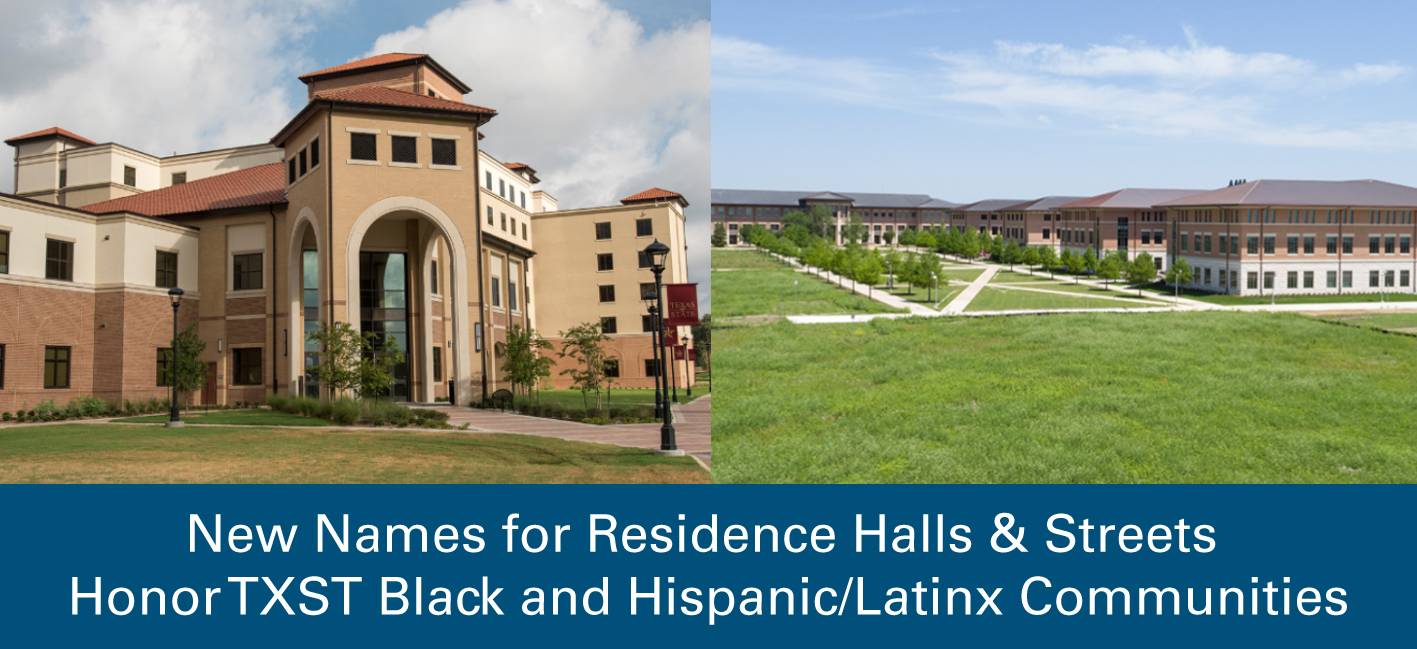
On May 20, 2021, The Texas State University System Board of Regents approved the motions set forth by Texas State University to rename two residence halls that were originally named for rivers – Angelina and San Gabriel on the San Marcos Campus – and name two unnamed streets on the Round Rock Campus after distinguished members of the Texas State family who are from the Black and Hispanic/Latinx communities.
This is the result of an inclusive and thorough nomination process conducted by the Texas State Naming Task Force, established by President Denise Trauth in September of 2020. The Naming Task Force engaged the university and surrounding communities, and received more than 40 nominations of influential alumni, former staff and faculty, and leaders from Black and Hispanic/Latinx communities for consideration. The Task Force, co-chaired by Dr. Gloria Martinez and Dr. Scott Bowman, evaluated each nomination.
Texas State renamed San Gabriel Hall to Elena Zamora O’Shea Hall, after the first known Latina student at Texas State in 1906. Angelina Hall was renamed to First Five Freedom Hall, after Dana Jean Smith, Helen Jackson Franks, Georgia Hoodye Cheatham, Gloria Odoms Powell, and Mabeleen Washington, who were the first Black students at Texas State in 1963. Two roads on the Round Rock Campus are named Adolfo Barrera Drive, after Dr. Adolfo “Sonny” Barrera, a former university administrator, for his work in multicultural programming, and Elvin Holt Drive, after Dr. Elvin Holt, the first Black professor in the Department of English, for his work in multicultural curriculum development.
“I hope that as we etch these names into our university’s history, we’re reminded of all the courageous trailblazers that came before us and helped shape our institution,” said President Denise Trauth. “They laid a foundation decades ago that we have a privilege and responsibility to build upon today, to move our institution to achieve greater levels of equity and inclusion.”
Learn more about the honorees:
-
First Five: Dana Jean Smith, Helen Jackson Franks, Georgia Hoodye Cheatham, Gloria Odoms Powell, and Mabeleen Washington
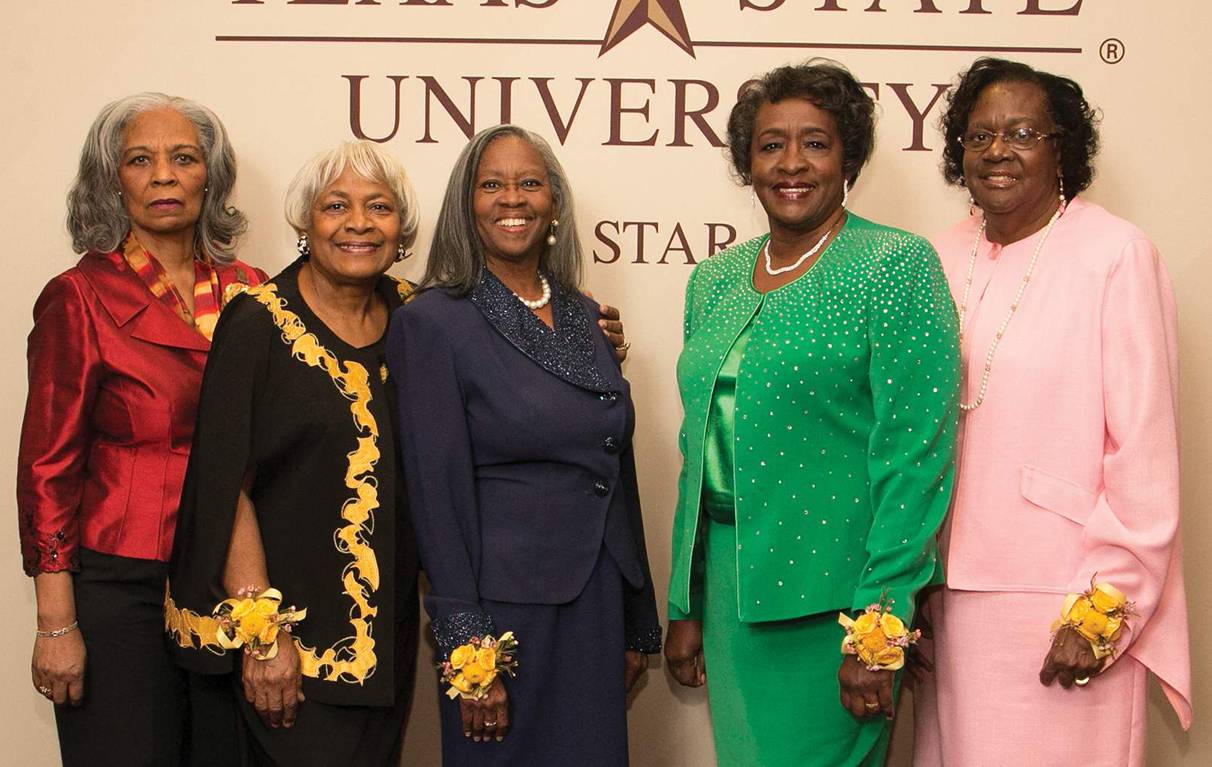
Dana Jean Smith, Helen Jackson Franks, Georgia Hoodye Cheatham, Gloria Odoms Powell, and Mabeleen Washington
In the summer of 1962, Dana Jean Smith, an 18-year-old Black woman, applied for admission to what was then called Southwest Texas State College. A graduate of Austin’s Anderson High School, Smith was academically qualified to enroll in the college. President John G. Flowers, in a letter dated June 22, 1962, said Smith’s application was rejected because of the whites-only provision in the charter establishing the college. He also informed her that only an act of the state Legislature or a court order would make it possible for Smith and other Black students to be admitted.
A similar letter was sent to another young Black woman who applied, Mabeleen Washington. “We had met all the requirements, but ‘we were of the Negro race,’” she said. “I wanted to go to college really, really bad. My dad told me he wouldn’t pay for college out of town.”
On February 4, 1963, U.S. District Judge Ben H. Rice Jr. signed the court order that ended segregation at the university. By 3:15 p.m. that day, Smith and three other Black women from San Marcos − Georgia Faye Hoodye, Gloria Odoms and Mabeleen Washington - registered for classes. The following day, Helen Jackson, a sophomore transfer from Huston-Tillotson College, also enrolled. Individually, “the five” have been active at the local and statewide level, contributing time and talents to various non-profits.
-
Elena Zamora O'Shea
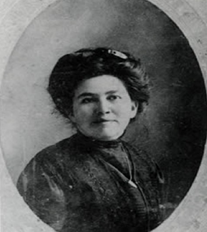 Elena Zamora O'Shea was born on July 21, 1880 to Porfirio Zamora and Gabina Moreno. She was the first known Latina student to attend Southwest Texas State Normal School (STSNS) in 1906 and the summers of 1911 and 1917. In 1895, at the age of fifteen, she began teaching children at a ranch in Hidalgo County, Texas. She understood that she would inevitably need a teaching certificate, leaving her home and arriving in San Marcos. In addition to attending STSNS, she also attended the normal school in Saltillo, Nuevo Leon, and the Universidad Autonoma de Mexico in Mexico City. She went on to teach in Alice, Texas in 1907-08; she served as the school’s principal; and, she continued to be involved in education for a total of 23 years. Her belief in the importance of education, directly and indirectly, influenced a number of family members to enter the field of education.
Elena Zamora O'Shea was born on July 21, 1880 to Porfirio Zamora and Gabina Moreno. She was the first known Latina student to attend Southwest Texas State Normal School (STSNS) in 1906 and the summers of 1911 and 1917. In 1895, at the age of fifteen, she began teaching children at a ranch in Hidalgo County, Texas. She understood that she would inevitably need a teaching certificate, leaving her home and arriving in San Marcos. In addition to attending STSNS, she also attended the normal school in Saltillo, Nuevo Leon, and the Universidad Autonoma de Mexico in Mexico City. She went on to teach in Alice, Texas in 1907-08; she served as the school’s principal; and, she continued to be involved in education for a total of 23 years. Her belief in the importance of education, directly and indirectly, influenced a number of family members to enter the field of education.In addition to her work as an educator, Elena Zamora O'Shea addressed her concern about the lack of information in print on her forefathers, Spanish land grant settlers who fought for Texas independence. As a result, she became a lay-historian and author of the book El Mesquite, a fictionalized account of Mexican settlers between the Nueces river and the Rio Grande from 1575 to the early 1900s. This book is considered a major contribution to Mexican American literature and Texas letters.
She married Daniel O’Shea in Alice, Texas on January 20, 1912. Daniel, who was a stonemason, immigrated to the United States from England. They eventually settled in Dallas, Texas, where they raised their two children, Daniel and Kathleen. Elena Zamora O'Shea served her new city in a variety of ways, including being a member of the Latin American League and of the Dallas Woman’s Forum. She continued to serve the larger Rio Grande Valley when the opportunity arose.
Elena Zamora O’Shea died on March 24, 1951, preceded in death by her beloved Daniel. She likely never imagined that her strong will and her vision of fairness and equality would have far reaching effects almost a century and a half after her birth.
-
Dr. Elvin Holt
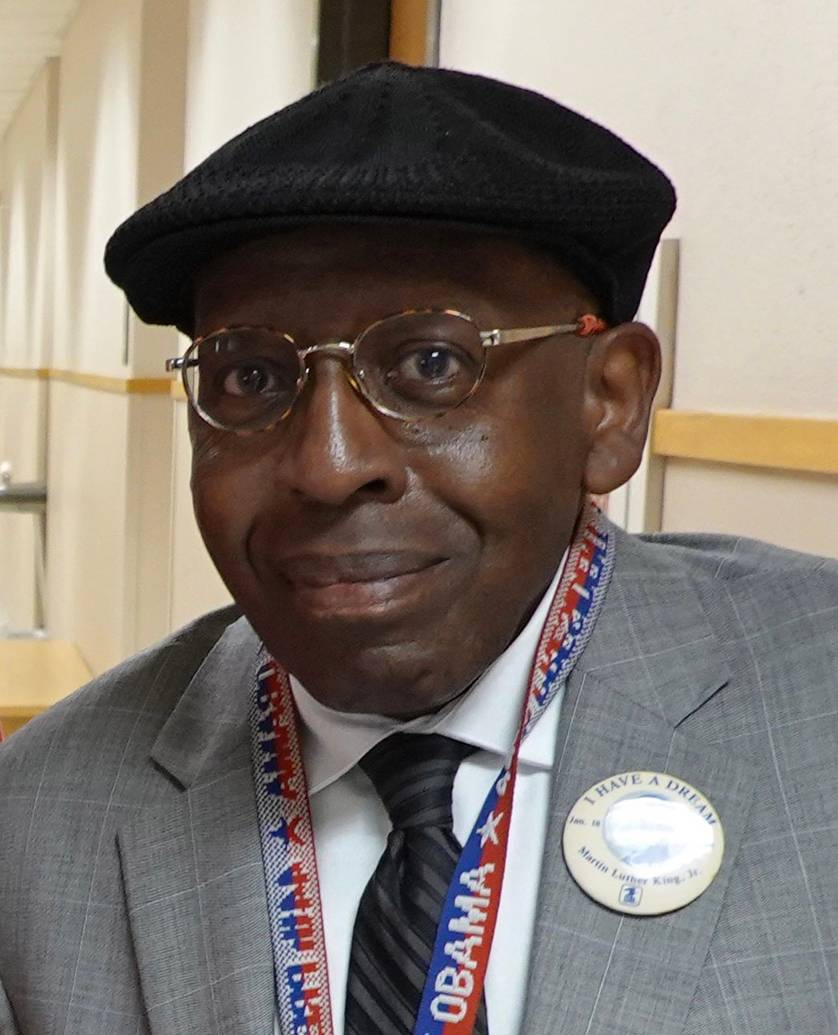
Dr. Elvin Holt, tenured Professor Emeritus in the Department of English (ret.), joined the Southwest Texas State University (SWT) faculty in 1983, serving the SWT/Texas State University and greater San Marcos community for 37 years. He earned a bachelor’s degree in English from Prairie View A&M University, a master’s degree in English from Southwest Texas State University, and a Ph.D. from the University of Kentucky in Lexington. He was one of twenty professors selected to participate in SWT’s first yearlong Excellence in Teaching and Learning Seminar. Dr. Holt has received three fellowships from the National Endowment for the Humanities, and he was named Professor of the Year by the Association of Black Students in 1989. He was selected as an Alphi Chi Favorite Professor in 2015. Dr. Holt received the Dean's Excellence in Teaching Award in 2009. Dr. Holt’s research, publications, and conference presentations focused on African literature, African American literature and cultural studies, folklore, and children's literature. Also, he developed and taught courses in the Honors College. Dr. Holt was the first African American tenured professor in the Department of English. Additionally, he is co-editor of Acting Up and Getting Down: Plays by African American Texans and co-author of Stages of Struggle and Celebration: A Production History of Black Theatre in Texas (both with Dr. Sandra Mayo).
Dr. Holt has served both within his academic community and the larger community, including serving on numerous committees at the department, college, and university levels, as well as serving as a member of the Heritage Association of San Marcos, the San Marcos Historic Preservation Commission, Hays County Historical Commission, LBJ-MLK Crossroads Memorial Committee, and the San Marcos Sesquicentennial Commission. For several years, he served as a Sunday school teacher and brotherhood president for First Baptist Church (NBC), and he has served as secretary for the Pride of San Marcos Lodge No. 494 PHA for more than 30 years. Most notably he is an original board member and former secretary and past president of the Calaboose African American History Museum, Inc. in San Marcos, Texas.
-
Dr. Adolfo R. Barrera
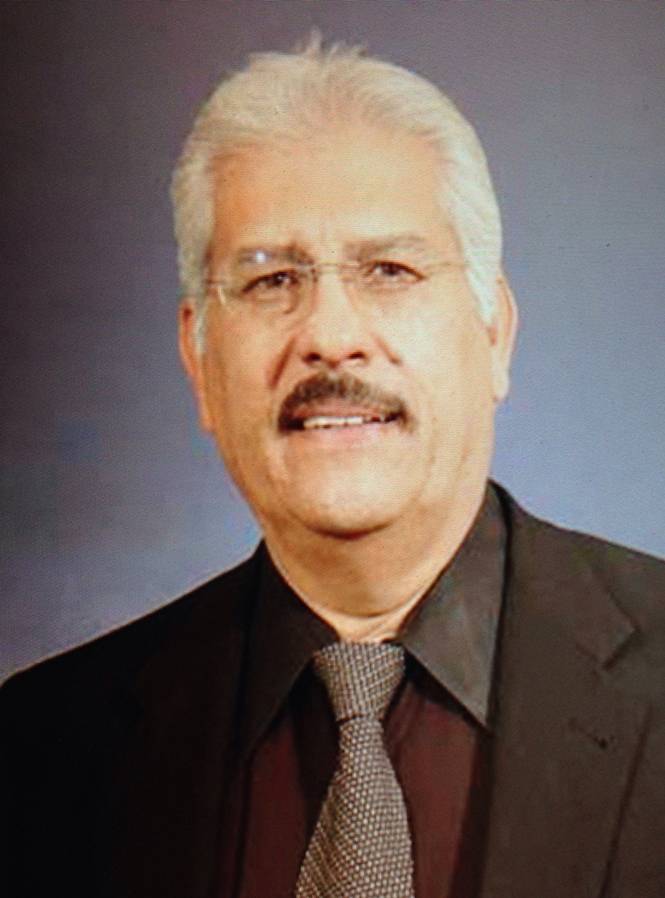 Dr. Adolfo R. "Sonny" Barrera was a counselor, leader, and administrator at Southwest Texas State University for 19 years from 1983 - 2002. His first appointment was as Assistant Dean of Students and Academic Services for Minority Affairs. He was promoted to Director of Minority Student Affairs and led to his final title of Assistant Vice President for Student Affairs. At their respective times, each of these appointments were inaugural positions, and Dr. Barrera played an integral role in the development of multicultural programming at Texas State University. Specifically, he was charged with overseeing the recruitment and retention of multicultural students, the expansion of TRIO programs including the re-establishment of Upward Bound and Student Support Services,and establishment of Educational Talent Search and Rural Talent Search, Youth Opportunities Unlimited/Pre College Summer Enrichment Program, College Assistance Migrant Program (CAMP), Brownsville Educational Summer Outreach (BESO) Program, Student Learning Assistance Center's Supplemental Instruction Lab, USDA's Summer Food Service Program, Underrepresented Student Advisory Council (USAC), and the enhancement of scholarship opportunities for first generation students at Texas State University. He counseled and mentored many students who were first generation and ethnic minority students on personal, financial, and academic issues and developed student leadership opportunities. His work at Texas State University paved the way for the establishment as a Hispanic Serving Institution (HSI).
Dr. Adolfo R. "Sonny" Barrera was a counselor, leader, and administrator at Southwest Texas State University for 19 years from 1983 - 2002. His first appointment was as Assistant Dean of Students and Academic Services for Minority Affairs. He was promoted to Director of Minority Student Affairs and led to his final title of Assistant Vice President for Student Affairs. At their respective times, each of these appointments were inaugural positions, and Dr. Barrera played an integral role in the development of multicultural programming at Texas State University. Specifically, he was charged with overseeing the recruitment and retention of multicultural students, the expansion of TRIO programs including the re-establishment of Upward Bound and Student Support Services,and establishment of Educational Talent Search and Rural Talent Search, Youth Opportunities Unlimited/Pre College Summer Enrichment Program, College Assistance Migrant Program (CAMP), Brownsville Educational Summer Outreach (BESO) Program, Student Learning Assistance Center's Supplemental Instruction Lab, USDA's Summer Food Service Program, Underrepresented Student Advisory Council (USAC), and the enhancement of scholarship opportunities for first generation students at Texas State University. He counseled and mentored many students who were first generation and ethnic minority students on personal, financial, and academic issues and developed student leadership opportunities. His work at Texas State University paved the way for the establishment as a Hispanic Serving Institution (HSI).In his various leadership roles, he provided support for minority student development programs from recruitment through graduation. Futhermore, he initiated and developed a campus-wide integrated retention program for minority students. He wrote proposals and assisted others in writing proposals to obtain grants and/or gift support for the university's interest in minority recruitment and retention. In addition to the support that Dr. Barrera provided to the university, he similarly served the profession and the community. He served as Vice President of Student Affairs at Palo Alto College, where he continued his support of Latino students at a Hispanic Serving Institution, a personal professional quest, where he served until he retired in 2007. His outstanding characteristic was mentoring students to be successful in their endeavored careers.
On Friday, Nov. 12, Texas State University renamed two residence halls on the San Marcos Campus in honor of the five Black women who integrated Texas State in 1963, and Elena Zamora O'Shea, the first known Latina student to attend Texas State in 1906.
